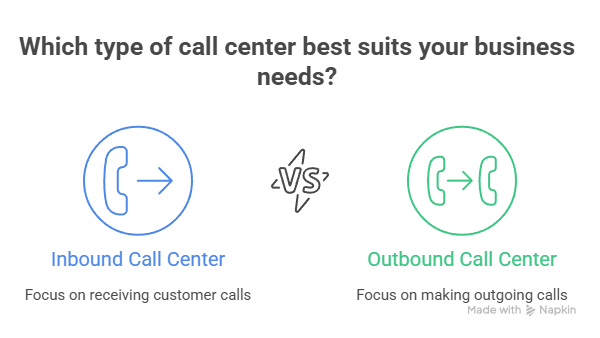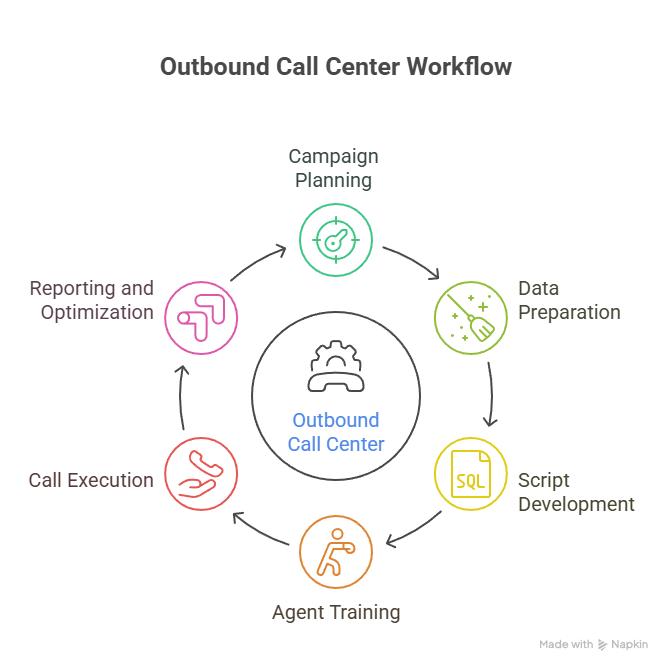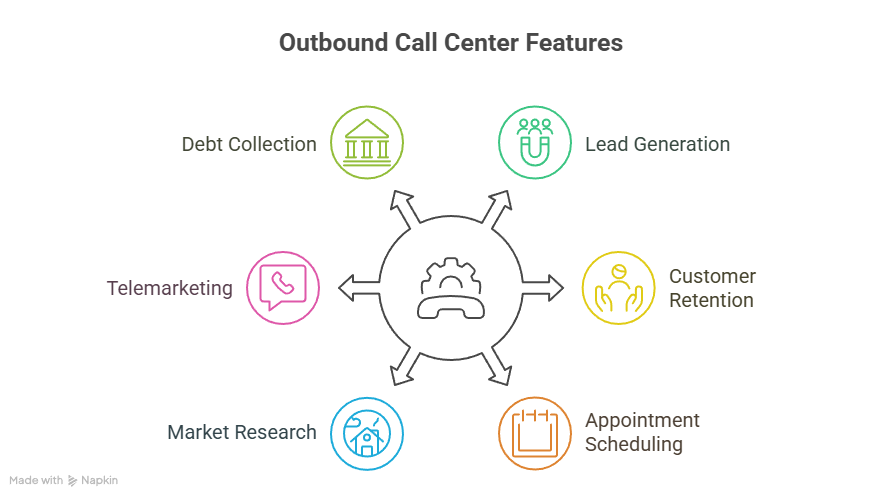
Outbound Call Service Center: Drive Sales Growth and Customer Engagement
An Outbound Call Service Center focuses on proactive customer communication, helping businesses generate leads, increase sales, collect feedback, and strengthen customer relationships. These centers manage outbound campaigns using trained agents who specialize in telemarketing, customer follow-ups, surveys, and appointment scheduling.
What Is an Outbound Call Service Center?
An Outbound Call Service Center is a specialized facility where trained agents make outgoing calls on behalf of a business. Unlike inbound centers that focus on receiving customer calls, outbound centers initiate contact to promote products, follow up on leads, or conduct surveys. These centers play a vital role in helping organizations expand customer outreach, build brand awareness, and improve conversion rates.
By combining human expertise with modern technology like CRM systems and call automation tools, outbound call centers streamline sales and marketing operations efficiently. They serve as a critical link between businesses and their audiences, ensuring that every call adds measurable value.
How Outbound Call Service Centers Work

Before diving into outbound operations, it’s essential to understand the systematic workflow that ensures campaign success. Each outbound call campaign follows a step-by-step process to achieve its objectives effectively. Here’s how these centers work from planning to performance optimization:
1. Campaign Planning
Every successful outbound campaign begins with clear and measurable goals. The process starts by identifying whether the focus is on lead generation, telemarketing, feedback collection, or customer reactivation. Proper campaign planning ensures resources are aligned with business objectives, maximizing the impact of every outbound call.
2. Data Preparation
Data preparation is a crucial stage where customer lists and lead databases are cleaned, verified, and segmented. Segmentation is typically done based on factors such as demographics, purchase history, or interest level. This ensures that calls are targeted, personalized, and relevant to the recipient.
3. Script Development
Developing a well-crafted call script helps agents communicate effectively and maintain consistency. Professionally written scripts guide conversations, address customer objections, and ensure compliance with company policies. These scripts are tested and refined continuously for tone, engagement, and conversion quality.
4. Agent Training
Agents undergo comprehensive training sessions before they start making calls. Training focuses on product knowledge, brand voice, and objection-handling techniques to enhance success rates. This equips agents with the skills and confidence required to represent the business professionally in every conversation.
5. Call Execution
During execution, agents use advanced dialers or CRM-integrated systems to manage call flows efficiently. They track interactions in real time, record responses, and update customer data immediately. This ensures seamless coordination and accurate reporting for each call made.
6. Reporting and Optimization
Once campaigns are live, performance tracking becomes critical. Metrics like connection rate, conversion ratio, and average handling time are analyzed for insights. The collected data helps in optimizing strategies, refining scripts, and improving future campaigns.
Key Features of Outbound Call Service Centers

Outbound call service centers offer a wide range of specialized functions designed to support business growth. Each feature plays a unique role in enhancing communication, increasing sales, and gathering valuable insights. Below are the most impactful features every business can leverage:
1. Lead Generation
Lead generation campaigns focus on reaching out to potential customers and turning interest into qualified sales opportunities. Agents engage prospects through persuasive communication and data-driven outreach. This proactive approach ensures a steady pipeline of potential buyers, helping businesses meet and exceed revenue goals.
2. Customer Retention
Customer retention involves following up with existing clients to ensure satisfaction and maintain loyalty. These follow-up calls often identify issues early and open opportunities for upselling or cross-selling. By staying connected, businesses nurture stronger relationships and reduce customer churn.
3. Appointment Scheduling
Appointment setting campaigns are designed to coordinate meetings, demos, or consultations efficiently. Trained agents handle scheduling details, send reminders, and confirm attendance. This reduces missed opportunities and ensures that sales teams focus on qualified and ready-to-meet prospects.
4. Market Research and Surveys
Outbound centers also conduct surveys to gather market intelligence and customer opinions. Agents use structured questionnaires to collect valuable feedback that drives product and service improvements. These insights enable companies to make data-backed strategic decisions and maintain competitive advantage.
5. Telemarketing and Sales Campaigns
Telemarketing campaigns offer a personalized human touch that digital ads often lack. Agents directly promote new products or services, highlighting benefits tailored to each prospect’s needs. This one-on-one engagement increases brand recall and significantly improves conversion rates.
6. Debt Collection and Payment Reminders
Outbound teams play a vital role in ensuring financial stability for businesses. Agents make courteous calls regarding payment reminders, subscription renewals, or billing queries. These communications not only enhance compliance but also build trust by maintaining transparency.
Benefits of Using an Outbound Call Service Center
Businesses that invest in outbound call services experience significant growth across multiple performance metrics. These centers combine the power of technology, strategy, and human expertise to deliver measurable outcomes. Below are the major benefits companies can expect:
1. Increased Sales Opportunities
Consistent outbound efforts open doors to a larger customer base and uncover untapped markets. By maintaining a steady communication flow, businesses boost brand exposure and drive conversions. Every call made can turn into a new opportunity for business growth and sales expansion.
2. Enhanced Customer Engagement
Outbound call agents deliver personalized communication that fosters customer trust. Engaging directly with clients makes them feel valued and understood. As a result, customers are more likely to remain loyal and recommend the brand to others.
3. Cost-Effective Marketing
Outsourcing outbound operations is far more affordable than maintaining an internal calling team. Companies save money on recruitment, training, and infrastructure costs. This model allows them to focus resources on other strategic initiatives without sacrificing communication quality.
4. Real-Time Performance Tracking
Advanced analytics and CRM dashboards provide real-time visibility into campaign performance. Managers can track success rates, agent productivity, and customer satisfaction instantly. These insights help optimize strategies quickly, ensuring continuous improvement.
5. Scalable Operations
One of the biggest advantages of outbound centers is scalability. Businesses can increase or decrease call volumes depending on seasonal demand or project size. This flexibility allows for efficient allocation of resources while maintaining quality service.
6. Professional Brand Representation
Every agent acts as the voice of the brand, ensuring consistent tone and messaging. They are trained to handle queries, objections, and conversations with professionalism. This results in a cohesive brand image that strengthens reputation and credibility.
How to Use an Outbound Call Service Center
To maximise success, businesses must adopt a structured approach when implementing outbound services. Each step contributes to creating a high-performance campaign that drives results. Below is a complete roadmap for leveraging an outbound call center effectively:
Step 1: Choose a Reliable Provider
Start by selecting a service provider with a proven track record in outbound campaigns, customer engagement, and sales conversion. Check for testimonials, case studies, and technological capabilities. The right partner ensures reliability, compliance, and success.
Step 2: Define Your Goals
Clearly define what you aim to achieve through outbound communication. Whether it’s lead generation, customer follow-ups, surveys, or cross-selling, setting measurable objectives ensures focus. These goals guide every strategic and operational decision during campaign execution.
Step 3: Prepare Data and Scripts
Provide updated customer databases, detailed campaign briefs, and approved call scripts. Accurate data enhances targeting precision, while consistent scripts maintain brand integrity. Both elements work together to deliver a coherent and effective communication flow.
Step 4: Launch the Campaign
Once planning and preparation are complete, agents begin executing calls through CRM systems. These systems automatically record responses and progress for real-time monitoring. Early feedback is analyzed to ensure immediate adjustments if needed.
Step 5: Monitor Results
Monitoring ensures continuous performance improvement. Metrics such as response rate, conversion ratio, and customer satisfaction indicate success levels. Detailed reports guide businesses in refining strategies and identifying growth areas.
Step 6: Optimise Campaigns
Campaign optimisation is an ongoing process. By studying analytics, businesses can fine-tune scripts, timing, and audience segmentation. The goal is to increase conversion rates and deliver better customer experiences with every iteration.
Limitations of Outbound Call Service Centers
While highly effective, outbound call centers do face certain challenges. Awareness of these limitations allows businesses to plan better and ensure compliance. Here are the primary challenges to consider:
1. Compliance Challenges
Outbound calls must always adhere to strict regulations like GDPR, TCPA, and Do Not Call (DNC) lists. Non-compliance can lead to penalties and reputational harm. Working with reputable providers ensures adherence to these legal frameworks.
2. Call Rejection Rates
Despite best efforts, not every prospect will respond positively. Many customers may decline calls or ignore them altogether. Persistence, timing, and quality scripts can help reduce rejection rates over time.
3. Language and Cultural Barriers
For global campaigns, linguistic and cultural differences can affect understanding and rapport. Hiring multilingual agents or regional specialists helps overcome this challenge. Customizing scripts for local contexts also improves communication quality.
TaskVirtual: Your Partner in Outbound Call Assistance Services
Managing outbound campaigns, customer outreach, and lead generation can often overwhelm internal teams. From data preparation and scripting to compliance and performance tracking, the process demands time, expertise, and precision. TaskVirtual simplifies these challenges by offering professional virtual outbound call assistance services that help businesses enhance sales, build engagement, and maintain customer relationships seamlessly.
1. Expert Consultation and Campaign Management
TaskVirtual’s experienced virtual assistants specialize in planning, executing, and managing outbound calling campaigns. They assist businesses in designing scripts, segmenting data, and ensuring communication consistency across all calls. With a focus on lead generation, follow-ups, and customer satisfaction, their team ensures each campaign meets measurable business goals.
2. Affordable and Flexible Pricing
Building an in-house outbound team can be expensive and time-consuming. TaskVirtual makes it cost-effective with flexible plans starting from just $3.12/hour to $14.99/hour, making professional outreach accessible to startups and enterprises alike. Their scalable model ensures you pay only for what you need, with no hidden costs.
3. Comprehensive Communication Support
From telemarketing and appointment scheduling to feedback collection and reactivation campaigns, TaskVirtual covers all aspects of outbound communication. Their dedicated assistants are trained in CRM tools, compliance standards, and brand representation. Whether short-term or ongoing support, TaskVirtual adapts to your workflow effortlessly.
4. Ongoing Quality Monitoring and Performance Tracking
TaskVirtual ensures that every interaction aligns with your brand’s goals and quality standards. Regular reporting, analytics, and feedback help optimize campaigns and improve efficiency. Their proactive monitoring guarantees consistent results and long-term client satisfaction.
5. Proven Track Record of Excellence
With 364 positive reviews and an impressive 4.7-star rating on trusted VA platforms, TaskVirtual is globally recognized as a reliable outsourcing partner. Businesses trust them to enhance customer engagement, streamline outbound operations, and boost ROI through expert virtual support.
Final Thoughts on Outbound Call Service Centers
An Outbound Call Service Center is more than just a calling operation—it’s a strategic partner that drives growth and engagement. By combining expert agents, advanced technology, and analytics-driven insights, businesses can reach customers effectively and boost conversions. Whether launching new products, reactivating dormant accounts, or conducting surveys, outbound centers deliver consistent results.
By outsourcing outbound communication, companies benefit from cost efficiency, professional representation, and data-driven performance management. It’s an investment that pays off through higher sales, improved retention, and stronger brand loyalty.
FAQ: Outbound Call Service Center
1. What is an Outbound Call Service Center?
It’s a dedicated facility where trained agents make outgoing calls for marketing, sales, and feedback collection.
2. Who can benefit from these services?
Businesses in retail, healthcare, finance, real estate, and technology sectors that rely on proactive customer engagement.
3. Do they handle B2B and B2C campaigns?
Yes, outbound call centers are equipped to manage both business-to-business and business-to-consumer campaigns effectively.
4. Is outsourcing outbound calling cost-effective?
Absolutely. Outsourcing minimizes internal costs, improves efficiency, and grants access to professional resources.
5. Can performance be tracked?
Yes. Detailed analytics and reports allow businesses to monitor and improve campaign performance continuously.








